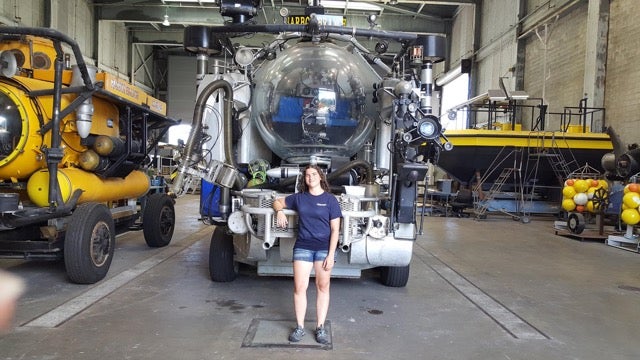KINGSTON, R.I. – April 10, 2018 – Karla Haiat has already studied hammerhead sharks in Hawaii, tested oceanographic sensors in Florida, conducted laboratory studies of fish sensory systems in Rhode Island, and researched the carbon cycle in Georgia. Now the University of Rhode Island junior is headed to California for a prestigious summer internship at the Monterey Bay Aquarium Research Institute to create a robot that mimics the behavior of the giant larvacean, a bizarre marine organism that makes a huge house out of its own mucus.
“I’m pretty sure the reason I got this internship has a lot to do with the diversity of research experiences that I’ve already had,” said Haiat, who is majoring in marine biology and ocean engineering. “The project I’ll be working on is a bio-engineering project, which is perfect for me since I have experience in both of these interdisciplinary fields.”
Haiat said the larvaceans’ mucus houses filter ocean water for tiny food particles. There are so many of them in Monterey Bay and they filter so much water that they have an impact on the carbon cycle in the area.
“It’s not just that they can filter so much water, it’s that their life strategies contribute to their evolutionary success, and we can learn a lot from their success,” she said. “Maybe someday we’ll be able to reverse engineer how they pump so much water through their house and that could inspire engineering solutions for relevant societal challenges.”
Haiat is just the second URI undergraduate student to ever be selected for an internship at the Monterey Bay Aquarium Research Institute.
A native of Mexico City, Haiat developed an early interest in marine science on family vacations to the East and West Coast. An uncle who works for NASA introduced her to the field of ocean engineering, which led to a passion for robotics. She enrolled at URI because it is one of the few universities in the country with notable academic programs in both marine biology and ocean engineering.
Following her freshman year, she was selected for an internship in Georgia to measure the export of carbon from rivers to the ocean.
“Since the moment I got that internship, I figured that if I could get that as a freshman, maybe I should pursue more internship opportunities,” Haiat said.
So she did.
During her sophomore year at URI, she helped Professor Brad Wetherbee in studies of shark migration patterns and “how programs like killing sharks to prevent shark attacks don’t really work.” That summer she used her engineering skills to design satellite tracking devices and other sensors for use in hammerhead shark research at the University of Hawaii.
“What I really liked about that project was that I had the freedom to create the tags the way I wanted,” she said. “It wasn’t about making it look pretty or making it float; it was about how to strategically place the sensors to get the data the scientists needed. That was my first real engineering project.”
Later that summer she worked on her second engineering project, this time at Harbor Branch Oceanographic Institute in Florida. Haiat helped develop an improved oceanographic instrument that would drift from the Indian River lagoon to the ocean while collecting data about harmful algal blooms and other characteristics of the marine environment.
Back on campus last fall, she assisted Professor Jacqueline Webb on studies of the sensory organs of fish, including measuring the density of fish otoliths, an ear bone that could shed light on fish hearing abilities. She is also collaborating with Assistant Professor Brennan Phillips to process data from a remotely operated vehicle (ROV) that collected information about biodiversity in oxygen minimum zones off the Pacific Coast of Mexico. She said that project has been particularly inspiring.
“What I’m passionate about is doing stuff like Professor Phillips does,” said Haiat, who is a member of the URI underwater robotics team. “He focuses on making ROVs less intrusive to animals and more specific for biologists in this new era of exploration. We have a need to adapt robots to make things easier for scientists to explore the ocean. He has the tools to explore whatever he’s interested in.
“That’s where I see myself going in the future,” she added. “My main interests involve deep-sea biology and ROVs, and I hope this next internship is going to keep me going in that direction.”

